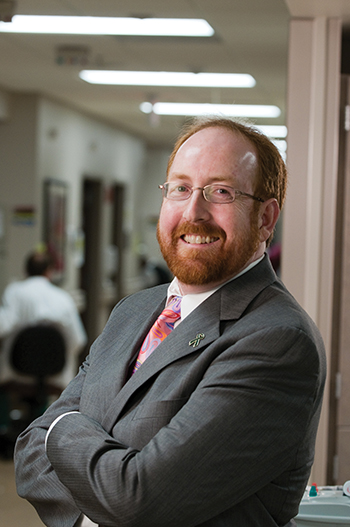Sarcoma Survivor

Long-time survivor lives life to the fullest
Andy Donnelly was diagnosed with an extremely rare type of soft tissue sarcoma at 38 years old. With no set treatment path ahead, he trusted his gut and relied on expert medical professionals and a strong support system. Today, he draws on his experiences to help others strive for a positive outcome.
Thinking I had acid reflux, heartburn or, worst case, a gallbladder issue, I had myself checked out. I did not expect to be told I had 28 tumors on my liver, or that the type of cancer that caused them affects about only one in a million people. The official diagnosis was epithelioid hemangioendothelioma, a soft tissue type of cancer.
It was such a unique diagnosis that neither my doctor nor I knew what the future held, so two months later, my girlfriend Tiffany and I got married in Jamaica.
The thought behind treating this rare cancer was chemotherapy to shrink the tumors, but it wasn’t very effective. However, because the tumors weren’t growing and I was stable, my doctor suggested we just sit tight. We did that for a year and a half, and then symptoms indicated we needed to try to treat again. My abdomen was distended, and my complexion was gray. I did not look or feel healthy.
My oncologist encouraged me to go to a local hospital for a liver transplant. I thought, “Why on earth would I do that?” But when the doctor explained it may offer the possibility of a normal, healthy life, I agreed. Six months later I was added to the transplant list.
Liver transplants depend on blood type and body size. My blood type is B-positive, which is uncommon — so uncommon, in fact, that it was unlikely that a B-positive liver would be available soon or ever. I was the only person on the list with a B-positive blood type. But, by sheer luck, 12 days later, I got the call that a liver was available.
The transplant was successful. My wife could see the change in my complexion immediately. After a 12-night stay in the hospital, I began a physical therapy schedule that helped me regain the muscle tone I’d lost from a failing liver. I believe my age – 40 – was an asset in my recovery. Less than a year later, I got involved with the Transplant Games, an athletic competition for transplant survivors. I used my talents as a former competitive swimmer and came away with several medals.
For 18 years, I had what a new liver promised: a normal and healthy life. I made a career move that changed my life and, hopefully, the lives of many other people. I work for a non-profit organization called Gift of Life. Our goal is to educate the public about organ and tissue donation. We are in 120+ schools in Kansas City and more across the country. I also started and manage our mentoring program for transplant patients, living donors and caregivers. A doctor can tell you the mechanics of a transplant and you can read all about one, but talking to someone who has lived it and succeeded with it is invaluable.
When people say it takes a village to get through something like this, they aren’t kidding. I have incredible support. My wife is amazing. She’s smart and knows how to research this weird cancer. My four sisters, family, friends and colleagues all offered help. At a time when I felt really down, they came together and pulled off a huge fundraiser for me. More than 500 people attended, and it stunned me to know that many people actually cared. It gave me a real boost when I needed it.
During one of my recent follow-up visits, results from a PET showed a recurrence. The cancer metastasized, and I have tumors in my neck, spine and bone. After four months of chemotherapy, one marble-sized tumor near my belly button continued to grow, so it was removed surgically. A follow-up PET showed no other growth.
I was referred to a specialist who performs personalized testing on tumors to determine the types of medications they may respond to, so we sent the tumor that was removed to him. He has recommended treating with a specific chemotherapy. As I am currently stable, beginning treatment isn’t urgent. He agreed that I could get some living in before treatment tethers me close to home.
Having a voice in my treatment plan gives me some control over my situation. Tiffany and I just celebrated our 20th anniversary, and we have a few trips planned. We’ll be all over the U.S. at a family wedding and attending concerts. I’m not bursting with energy, but I feel really good and organ donation made that possible.


